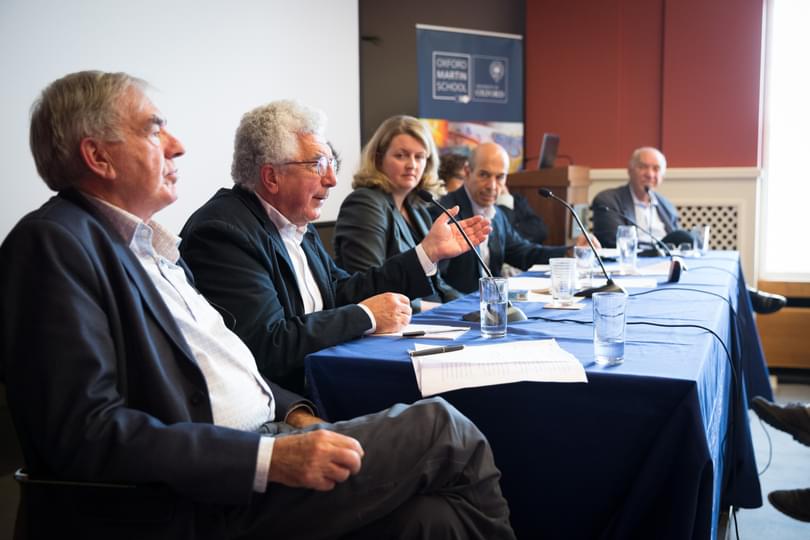
The Oxford Martin School brought together experts from across Oxford on 26 October for a panel discussion on responses and solutions to the current migrant and refugee crisis.
Chaired by Professor Ian Goldin, the panel comprised:
- Professor Bridget Anderson, Professor of Migration and Citizenship and Deputy Director of COMPAS
- Dr Julien Brachet , Marie Curie Senior Research Fellow, International Migration Institute
- Dr Colin Bundy, Honorary Fellow and former Principal, Green Templeton College
- Professor Robin Cohen, Emeritus Professor and Former Director, International Migration Institute
- Dr Cathryn Costello, Andrew W Mellon Associate Professor of International Human Rights and Refugee Law, Refugee Studies Centre
- Professor Avi Shlaim, Emeritus Fellow, St Antony's College and former Professor of International Relations, University of Oxford
- Dr Nicholas Van Hear, Senior Researcher and Deputy Director, COMPAS
Opening the discussion, Dr Colin Bundy set the historical context for the current crisis, saying that the existence of migrants and refugees was “as old as recorded history”. He reflected on how nations had worked together to cope with previous mass migrations, such as those caused by the First and Second World Wars, adding: “Sadly, political will and humanitarian impulses are in short supply today.”
Dr Julien Brachet noted that attempting to stop people moving between countries did not stop them at all but simply led to them taking risky illegal routes. Giving insights from his research into trans-Saharan migration, he said the spotlight on the current crisis risked obscuring what was going on around it, and that in some countries crisis management was “a mode of government”.
Professor Avi Shlaim said today’s situation in Syria was “one of the most complex international crises" he had ever encountered. To begin to find a solution to the problem he said a conference under the auspices of the UN should be convened, involving President Bashar al-Assad and regional and international parties including Russia and Iran, with a view to securing a “grand bargain” guaranteeing that Assad would cease killing civilians and consent to a political process leading to free elections.
Dr Cathryn Costello argued that safe, affordable migration routes were available but that policies and practices governing migration prevented people taking them, saying the suppression of mobility was “a huge part of why this has become a crisis”. She added: “The poignant irony is that the ferry from Turkey to Greece is 15 euros – the dinghy journey is over 1,000.”
Professor Bridget Anderson said that people’s refusal to remain “'deserving’ refugees” who would be rescued from camps, and instead make their own way to safe countries, meant that they were not treated as they should be when they arrived. “This determined focus on those believed to be the so-called most vulnerable reveals that all our models inevitably exclude as they include,” she said.
Professor Robin Cohen and Dr Nicholas Van Hear set out two radical solutions to the crisis, the creation of a ‘Sesame Pass’ conferring “liquid transnational citizenship” upon the holder and of a “trans-national polity” named Refugia. Professor Cohen said the ideas were likely a “figment in the imagination of two long-in-the-tooth utopians”, but that refugees should not just be viewed as victims but as “people who can build futures for themselves”.
Commentary on the panellists’ arguments was given by Dr Oliver Bakewell, Director of the International Migration Institute and Professor Alex Betts, Leopold Muller Professor in Refugee and Forced Migration Studies, at Oxford's Refugee Studies Centre, before questions were taken from the audience.